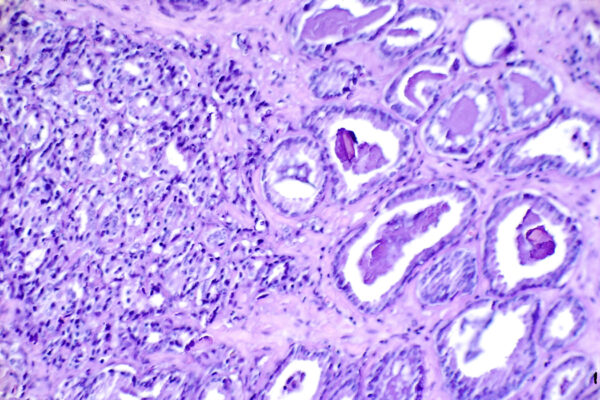
Advanced prostate cancer has a new treatment option, a Johnson & Johnson drug that combines two of the company’s therapies in a single pill.
The FDA approval of the J&J drug, brand name Akeega, covers adults whose cancer has spread and no longer responds to hormone therapies. Crucially, the cancer must also have a BRCA mutation. One of the components of the drug, niraparib, is specifically designed to address this mutation. The FDA also approved a Foundation Medicine companion diagnostic that identifies patients whose cancer has the BRCA mutation.

With the Rise of AI, What IP Disputes in Healthcare Are Likely to Emerge?
Munck Wilson Mandala Partner Greg Howison shared his perspective on some of the legal ramifications around AI, IP, connected devices and the data they generate, in response to emailed questions.
Niraparib is small molecule designed to block PARP, an enzyme important to the way cancer cells repair DNA damage. Cancers with BRCA mutations are sensitive to drugs that block PARP. Akeega pairs that niraparib with Zytiga, a blockbuster J&J drug that won its first FDA approval in prostate cancer in 2011. Zytiga is a small molecule that leads to blocking of the synthesis of androgens, hormones that support prostate cancer progression. This drug must be administered with prednisone, a corticosteroid.
FDA approval of Akeega is based on the results of a placebo-controlled Phase 3 study. The main goal was to measure radiographic progression-free survival (rPFS), which was defined as the time from randomization to progression of the cancer as shown by imaging, or death, whichever comes first. The results showed that participants with BRCA-positive cancer that was treated with Akeega plus prednisone had a statistically significant 47% risk reduction in rPFS. The most common adverse events reported in the study included muscle pain, fatigue, constipation, hypertension, and nausea.
Akeega won its first regulatory approval in April in the European Union. With the FDA approval, the drug will now compete against two PARP inhibitors that won their U.S. approvals in June for treating prostate cancers. The AstraZeneca and Merck-partnered drug Lynparza was first, winning a regulatory nod for use in combination with abiraterone. Weeks later, the agency approved Pfizer’s PARP-blocker Talzenna for use in combination with Xtandi, a drug that’s already a blockbuster prostate cancer therapy for the pharmaceutical giant.
J&J’s Janssen subsidiary licensed rights to niraparib from Tesaro, a cancer biotech that GSK acquired in 2019. GSK currently markets the drug as Zejula for treating ovarian cancer. J&J’s 2016 deal with Tesaro granted it exclusive global rights, except for Japan, for use of the drug in treating prostate cancer. The approval of Akeega marks the first FDA approval of its PARP-blocking pharmaceutical component for applications in prostate cancer.
“Janssen’s legacy of advancing the science of prostate cancer has contributed to the evolution of transformational treatment approaches for more than a decade,” Kiran Patel, vice president, clinical development, solid tumors at Janssen Research & Development, said in a prepared statement. “This milestone, which marks the approval of Janssen’s third prostate cancer treatment, highlights the importance of advancing precision medicine approaches and genetic testing for the treatment of patients with BRCA-positive [metastatic castration-resistant prostate cancer].”
Public domain image by the National Cancer Institute














